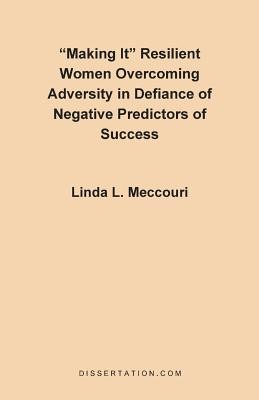
- We will send in 10–14 business days.
- Author: Linda L Meccouri
- Publisher: Dissertation.Com. - Do Not Use
- Year: 1995
- Pages: 168
- ISBN-10: 1581120354
- ISBN-13: 9781581120356
- Format: 14 x 21.6 x 1 cm, minkšti viršeliai
- Language: English
- SAVE -10% with code: EXTRA
Reviews
Description
Social indicators such as low socioeconomic status, minority status, battering, chronic illness, trauma, drug and alcohol addiction, and poor social environment are negative predictors of educational and social success. Why is it that some people, however, overcome adversity and succeed despite the odds? This study identifies and describes the context and factors involved for an ethnically diverse group of twenty adult women from low socioeconomic status being able to "succeed" despite the odds. Using qualitative in-depth oral history interviews, this study includes women whose voices are seldom heard in the literature - those who have many of the social indicators associated with failure, but who have defied the negative predictors for success and persisted beyond high school to post-secondary education. Among the questions explored are: How do these women define "success"? What were the barriers? What were the factors in overcoming adversity? and how can their voices inform policy and practice in adult and post-secondary educational programs?
The data revealed the following major themes.
- The presence of dynamic advocates or "healers" who extend beyond traditional roles to help and "believe" in the women.
- The importance of social structures and programs designed to assist non-traditional women as they seek post-secondary education.
- Making a difference for others and giving back to their communities as definitions of "success".
- Barriers such as conflict with dominant group cultural capital, and destructive teaching practices.
- The importance of strong and supportive relationships with family and/or friends.
- The importance of connection to spiritual/religious practice and people.
EXTRA 10 % discount with code: EXTRA
The promotion ends in 21d.20:59:18
The discount code is valid when purchasing from 10 €. Discounts do not stack.
- Author: Linda L Meccouri
- Publisher: Dissertation.Com. - Do Not Use
- Year: 1995
- Pages: 168
- ISBN-10: 1581120354
- ISBN-13: 9781581120356
- Format: 14 x 21.6 x 1 cm, minkšti viršeliai
- Language: English English
Social indicators such as low socioeconomic status, minority status, battering, chronic illness, trauma, drug and alcohol addiction, and poor social environment are negative predictors of educational and social success. Why is it that some people, however, overcome adversity and succeed despite the odds? This study identifies and describes the context and factors involved for an ethnically diverse group of twenty adult women from low socioeconomic status being able to "succeed" despite the odds. Using qualitative in-depth oral history interviews, this study includes women whose voices are seldom heard in the literature - those who have many of the social indicators associated with failure, but who have defied the negative predictors for success and persisted beyond high school to post-secondary education. Among the questions explored are: How do these women define "success"? What were the barriers? What were the factors in overcoming adversity? and how can their voices inform policy and practice in adult and post-secondary educational programs?
The data revealed the following major themes.
- The presence of dynamic advocates or "healers" who extend beyond traditional roles to help and "believe" in the women.
- The importance of social structures and programs designed to assist non-traditional women as they seek post-secondary education.
- Making a difference for others and giving back to their communities as definitions of "success".
- Barriers such as conflict with dominant group cultural capital, and destructive teaching practices.
- The importance of strong and supportive relationships with family and/or friends.
- The importance of connection to spiritual/religious practice and people.


Reviews